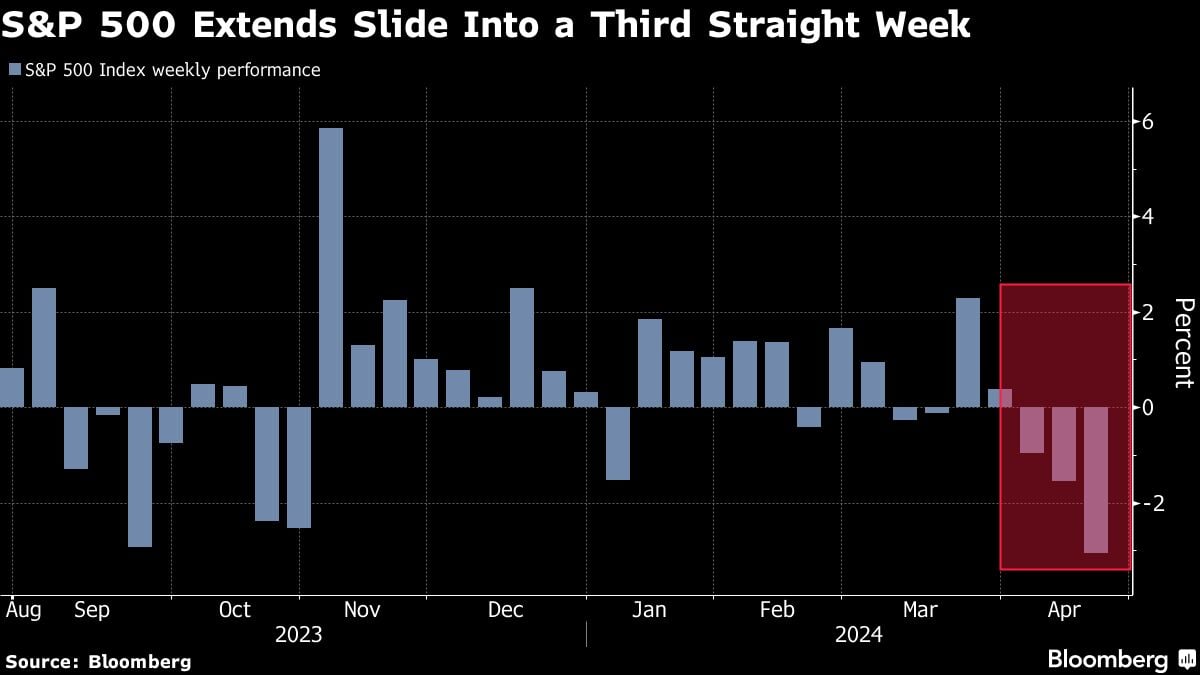'Mag 7' Get Crushed to Lead Losses in Stocks

What You Need to Know
The S&P 500 fell below 5,000, following hawkish Fedspeak, a flare-up in inflation and tensions in the Middle East.
A selloff in the world’s largest technology companies hit stocks, with traders also shunning riskier assets ahead of the weekend amid geopolitical uncertainties.
Equities fell at end of a week that saw the S&P 500 dropping below 5,000, following a rally that sent the benchmark to all-time highs and spurred warnings for a consolidation.
A drumbeat of hawkish Fedspeak and a flare-up in inflation worries have weighed heavily on sentiment, with investors trimming their bets on the keenly anticipated central bank pivot. While the latest tensions in the Middle East seemed contained, traders opted for a cautious stance.
That being said, nothing can be taken for granted, and markets may remain on edge — especially considering the looming weekend risk, according to Fawad Razaqzada at City Index and Forex.com. He added that inflation continues to be a focal point due to its potential influence on monetary policy.
“The stock market has been declining in recent weeks because rate cut expectations have dropped significantly — and investors are not surprisingly taking some profits after the strong market performance seen during the first quarter,” said Michael Landsberg, chief investment officer at Landsberg Bennett Private Wealth Management.
The S&P 500 is on track for its sixth consecutive drop — the longest losing streak since October 2022. The Nasdaq 100 fell 1.5%.
The “Magnificent Seven” megacaps that have powered this year’s surge slumped, with Nvidia Corp. down over 4% and Apple Inc. heading for its lowest close in almost a year. Netflix Inc. tumbled on a bearish forecast.
Treasury 10-year yields declined one basis point to 4.62% — almost erasing an earlier plunge of 14 basis points. Oil trimmed a major advance to trade only marginally higher after Iranian media appeared to downplay the effect of Israeli strikes.
The stock market is heading toward its third consecutive weekly decline — the longest losing run since September. After a 10% gain in the first quarter — the strongest start to a year since 2019 — investors have been increasingly skeptical about how much further it could go over the near term, even accounting for the continued strength in the economy.
“Geopolitical and political uncertainty join inflation, rates, and the Fed in pressuring markets, driving a rapid and dramatic shift in the complexion of markets and the attitude of investors,” said Mark Hackett at Nationwide.

Federal Reserve officials have said they will need to see more data to become confident enough that inflation is headed to their 2% target before starting to cut interest rates. Investors have dramatically pared bets on easing since the beginning of the year, with markets now seeing one or two rate cuts as likely in 2024, down from as many as six a few months ago.




